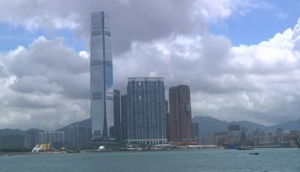
(Reuters) — Real estate markets in Asia Pacific are expected to deliver strong total returns in the next three years driven by the huge weight of capital coming into the region.
And with global stock markets expected to experience heightened volatility this year, real estate investment is likely to see even more interest.
Stuart Crow, Head of Capital Markets in Asia for real estate expert JLL, said: ”We’ve got some of the world’s largest investors looking to increase their allocation to real estate and direct real estate. Many are increasing their allocation to Asia Pacific and also rebalancing their portfolios away from fixed income and equities. So that’s driving a huge amount of transaction activity in Asia Pacific”.
The industry saw record transaction volumes of more than US$120 billion in 2014, followed by US$125 billion last year.
This year, JLL expects to see an incremental increase in volumes across the region. Another positive sign for the industry is that the amount of private equity available for real estate investment stands at near-record levels. This will help boost investment activity.
The amount of capital raised by Asia-focused funds totalled US$10 billion in January to November, 2015 – up more than 130% year-on-year. There are opportunities to acquire high-quality real estate assets in China and Japan’s regional cities, according to JLL’s latest Asia Pacific capital markets research. Prime CBD office assets are also being sold in Singapore, while commercial property owners in Hong Kong are looking to capitalise on the high capital values to lock-in high exit values. 2016 should also see investor interest improve in India and Korea.
Not only is capital coming into Asia from outside investors, but much of it originates from Asia itself as wealth grows within the region.
”In fact, more than 80% of transaction volumes in Asia Pacific are done by Asian investors. Capital has accumulated within pension funds, insurance funds and sovereign funds, particularly in China,” added Crow.
Despite the economic headlines in China, investment activity should remain at a similar level to 2015, according to JLL. While the Chinese economy shifts away from export-driven growth towards domestic consumption, there are plenty of opportunities for savvy investors.
Crow added: ”Investors have seen the Chinese economy advancing away from manufacturing towards a service-based economy and to some extent that’s attracting investors, particularly in the logistics sector”.
China, along with much of Southeast Asia, is experiencing rapidly-growing domestic consumption as their middle class populations expand. Another sector that is in the sweet spot of this trend is the retail sector. ”It’s a hugely attractive sector particularly in growing markets as it becomes a more mature sector for many of our investors,” said Crow.
While economic growth slows down to a more sustainable level in China, it is still very much the main driver for growth in the region and its property markets offer plenty of opportunity. While many Chinese investors are securing real estate assets outside the country there is a significant amount of capital heading towards domestic commercial real estate. Julien Zhang, Head of China Global and Managing Director of North China, said: ”We see insurance companies putting a certain percentage of their assets under management in the real estate sectors. If you compare the mature markets such as the U.S and European countries, most of the insurance companies in those countries already invest between 10% and 15% of their assets under management in real estate. But if you look at Chinese insurance companies most of them are only in the range of 1% to 2%. So there is huge room to grow”.
While 2015 was a year of big commercial real estate investment deals, this year is also expected to see more big deals come to market due to strong interest shown by cross-border Asian investors and global funds. Last year there were about 20 deals worth more than US$1 billion, compared to 15 in 2014. The average number of deals of this size was just five a year between 2011 and 2013. Alongside the investment opportunities available for real estate in the region, there is growing pressure on corporate real estate to be more in aligned with their business, helping to improve productivity and play a leading role in employee engagement. Angela Newby, Managing Director of Transaction Management, Asia Pacific, Corporate Solutions for JLL, explained: ”The core business stakeholder is now asking the corporate real estate function – How can real estate grow our business? It’s also looking at how we can attract the best talent. How can we then retain that talent and how can we then engage that talent, the employee engagement thereafter? The real estate function is being asked how they can help deliver on that”.
On the residential front, investors are looking beyond the traditional property hotspots of London and New York as strong capital appreciation has squeezed yields. Cities such as Manchester, Boston and Chicago are considered to be undervalued, according to JLL. ”Australia is popular with the Chinese. I think places like Brisbane, Melbourne and Perth are all cities that have room to grow,” said Anne Marie Sage, JLL’s Head of Business Development for International Residential, Asia. However, after four years of stellar growth, 2016 is expected be a little quieter and more challenging for traditional residential property hotspots.







